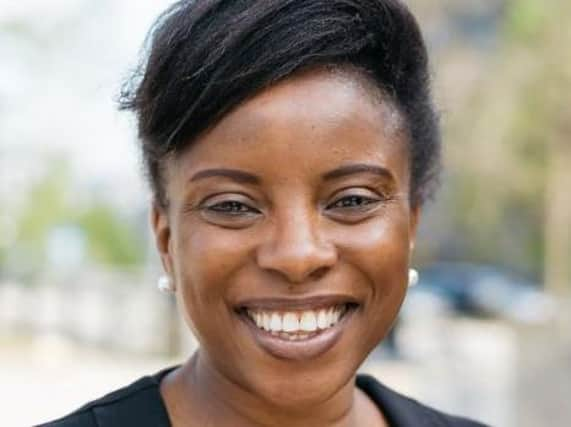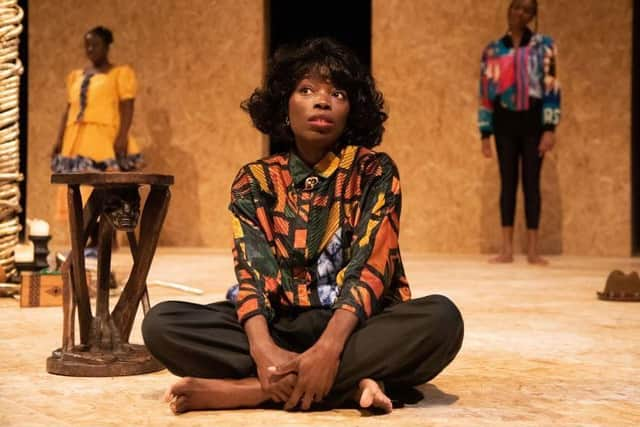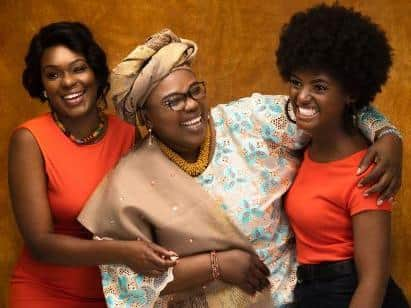Utopia Theatre is the only African theatre organisation in the North of England - and it's resident at Yorkshire's Sheffield Crucible


One of the great joys of bringing you this series of lockdown features has been being reminded of just how proud we can be of our cultural heritage.
In our region we have world-beating buildings and people who are creating work that would stand on any stage, anywhere and if that doesn’t make the chests of all good Yorkshire folk swell, I’m at a loss as to what will.
Advertisement
Hide AdAdvertisement
Hide AdThis preamble is to warn you: stand by for more chest-swelling content, because today I virtually visit another theatre company that should inspire yet more pride in the theatre artists of God’s Own County.


Utopia Theatre is the only African theatre organisation in the North of England – and it’s right here in Yorkshire, in Sheffield to be precise – resident at Sheffield Crucible to be exact.
It’s a bit of a special company is Utopia Theatre.
“With a unique style combining oral African storytelling traditions with that of the Western world, our company creates work which represents voices of the African diaspora in the 21st century,” says the company’s artistic director Mojisola Elufowoju.
I’ve recently been lecturing on playwriting at York University and I related to the students the tale of how I began writing because I didn’t see any stories on stage that reflected my life as a working class, mixed race person. Elufowoju has a similar tale.


Advertisement
Hide AdAdvertisement
Hide Ad“I founded Utopia Theatre in 2012. The vision for setting up the company came from the need to hear stories that I can connect to and to see more people that look like me being represented both on our stages and behind the scenes,” she says.
The conversation about this lack of representation and the battle to make sure the world of our stages reflect the cities around them is slowly creeping forward, but it is thanks to pioneers like Elufowoju that change feels like it might actually come this time.
It turns out she has gone back to Shakespeare for inspiration, copying the plan Hamlet put into practice with a group of actors.
“We believe that theatre is one way in which we can ‘catch the conscience’ of the people. We stage creative works from Africa and its diaspora through a process that actively engages African communities, facilitates the development of emerging artists and fosters dialogue and creative exchanges,” she says.
Advertisement
Hide AdAdvertisement
Hide AdThe company’s work covers three main areas: theatre production and touring in the UK and internationally, supporting new and developing artists and using African theatre and storytelling within the community.
“As the only African theatre organisation in the North of England, we hold a unique place in the British cultural landscape and a unique voice for African theatre in the diaspora. The company is dedicated to demonstrating the rich cultural heritage of Africa’s theatre canon and in so doing, dispel stereotypes and encourage authentic voices from the African diaspora.”
It’s a big challenge, but Elufowoju’s CV demonstrates she is more than up to the task.
Staff director at the National Theatre, she was a recipient of the 2017 Opera Awards Foundation bursary, a founding member of Mosaic Opera Collective and guest director at the London Academy of Dramatic Arts and London’s South Bank University.
Advertisement
Hide AdAdvertisement
Hide AdJust last month she won a Sheffield Star’s Women of Sheffield Award named after Marti Caine for Theatrical Innovation.
That innovative nature meant the company was ready when the pandemic hit.
“We pride ourselves on our ability to deliver work both live and digitally, with a wealth of online resources and digital events,” she says.
While the digital offering is impressive and growing it is, of course, on stage where the company’s storytelling strength really comes to life.
Advertisement
Hide AdAdvertisement
Hide AdIn 2016 the company brought to the stages of Sheffield, Leeds Playhouse and Cast in Doncaster a West African remastering of The Duchess of Malfi called Iyalode of Eti by Debo Oluwatuminu.
In that sliver of hope when the lockdown was eased in November last year, the company was also able to stage the world premiere of Oladipo Agboluaje’s Here’s What She Said To Me.
“Utopia Theatre has produced some online content – just because conditions are hard, it doesn’t let us off the hook, it doesn’t free us of the obligation to try to fulfil our mission. Since the beginning of the year we’ve done a number of Zoom plays and documented a series of masterclasses by leading African practitioners in Nigeria, Ghana and the UK,” says Elufowoju.
“Through our online engagement we’ve reached audiences far beyond Sheffield. We’ve received messages from people in Africa, America, Israel, North Korea. We plan to carry on our online work as it is very exciting to be able to reach so many people. We no longer need to be at the mercy of gatekeepers.”
Advertisement
Hide AdAdvertisement
Hide AdIt is a thrillingly optimistic take as we begin to see light at the end of the lockdown tunnel – and Elufowoju isn’t done.
She says: “It’s going to be a while before audiences return to our spaces in the numbers that we were used to before the pandemic. Stories will have to be told in simpler ways, with less sets and costumes.
“Theatres will have to tap into our collective imagination and rely less on the stuff of the stage and more on the physical bodies of the performers and the words they speak or sing and the movement of those bodies.”
Sounds brilliantly theatrical.